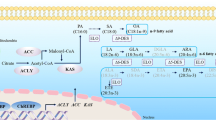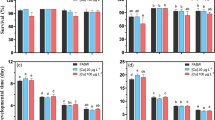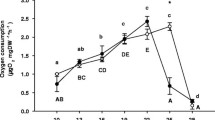Abstract
Global warming, increase of the atmospheric temperature leading to changes in climate, is a growing environmental concern for all organisms including marine organisms, and many efforts have been made to reveal the potential adverse effects on the systematics of aquatic organisms in response to the temperature changes. To examine the effects of temperature shifts on copepods in temperate and polar regions, we compared the life parameters and gene expression profiles of the de novo lipogenesis (DNL) pathway and heat shock protein (hsp) genes in the temperate copepod Tigriopus japonicus (T. japonicus) and the Antarctic copepod Tigriopus kingsejongensis (T. kingsejongensis). The median lethal temperature (LT50) and no observed effect level (NOEL) in the temperate copepod T. japonicus were determined to be 35.3 and 32 °C, respectively, in response to a temperature increase of 2 °C a day. In the Antarctic copepod T. kingsejongensis, the LT50 and NOEL were determined to be 24.8 and 12 °C, respectively. In addition, delayed developmental time and impaired fecundity were observed (P < 0.05) in response to temperature changes in T. japonicus. T. japonicus DNL pathway genes were down-regulated in response to high temperature, whereas T. kingsejongensis DNL pathway genes showed up-regulation in response to high temperature, indicating that these two Tigriopus species have different modes of action in response to temperature shifts. In both copepods, transcription of heat shock proteins (hsps) was mostly up-regulated in response to temperature shifts, but it showed moderate expression at 15 °C for T. japonicus and 4 °C for T. kingsejongensis. These findings indicate temperature shift-mediated species-specific modulations of the DNL pathway and hsps gene expression, leading to alteration of lipid synthesis and chaperoning with deleterious effects on the life parameters of these two copepods.
Similar content being viewed by others
References
Brodte E, Graeve M, Jacob U, Knust R, Pörtner HO (2008) Temperature-dependent lipid levels and components in polar and temperate eelpout (Zoarcidae). Fish Physiol Biochem 34:261–274. https://doi.org/10.1007/s10695-007-9185-y
Brugnano C, Guglielmo L, Ianora A, Zagami G (2008) Temperature effects on fecundity, development and survival of the benthopelagic calanoid copepod, Pseudocyclops xiphophorus. Mar Biol 156:331–340. https://doi.org/10.1007/s00227-008-1086-9
Downer RGH, Kallapur VL (1981) Temperature-induced changes in lipid composition and transition temperature of flight muscle mitochondria of Schistocerca gregaria. J Therm Biol 6:189–194. https://doi.org/10.1080/17451000903042461
Ghosh S, Strum JC, Bell RM (1997) Lipid biochemistry: functions of glycerolipids and sphingolipids in cellular signaling. FASEB J 11:45–50
Gladyshev MI, Semenchenko VP, Dubovskaya OP, Fefilova EB, Makhutova ON, Buseva ZF, Sushchik NN, Razlutskij VI, Lepskaya EV, Baturina MA, Kalachova GS, Kononova ON (2011) Effect of temperature on contents of essential highly unsaturated fatty acids in freshwater zooplankton. Limnologica 41:339–347. https://doi.org/10.1016/j.limno.2011.03.001
Han J, Won E-J, Hwang D-S, Shin K-H, Lee YS, Leung KMY, Lee J-S (2014) Crude oil exposure results in oxidative stress-mediated dysfunctional development and reproduction in the copepod Tigriopus japonicus and modulates expression of cytochrome P450 (CYP) genes. Aquat Toxicol 152:308–317. https://doi.org/10.1016/j.aquatox.2014.04.027
Han J, Puthumana J, Lee M-C, Kim S, Lee J-S (2016) Different susceptibilities of the Antarctic and temperate copepods Tigriopus kingsejongensis and Tigriopus japonicus to ultraviolet (UV) radiation. Mar Ecol Prog Ser 561:99–107. https://doi.org/10.3354/meps11946
Han J, Kim H-S, Kim I-C, Kim S, Hwang U-K, Lee J-S (2017) Effects of water accommodated fractions (WAFs) of crude oil in two congeneric copepods Tigriopus sp. Ecotoxicol Environ Saf 145:511–517. https://doi.org/10.1016/j.ecoenv.2017.07.065
Han J, Jeong C-B, Byeon E, Lee J-S (2018) Effects of temperature changes on the generation of reactive oxygen species and the expression and activity of glutathione-S transferases in two congeneric copepods Tigriopus japonicus and Tigriopus kingsejongensis. Fish Sci. https://doi.org/10.1007/s12562-018-1224-3
Hartl FU (1996) Molecular chaperones in cellular protein folding. Nature 381:571–579. https://doi.org/10.1038/381571a0
Hazel JR, Williams EE (1990) The role of alterations in membrane lipid composition in enabling physiological adaptation of organisms to their physical environment. Prog Lipid Res 29:167–227. https://doi.org/10.1016/0163-7827(90)90002-3
Hoegh-Guldberg O, Bruno JF (2010) The impact of climate change on the world’s marine ecosystems. Science 328:1523–1528. https://doi.org/10.1126/science.1189930
Huang HJ, Xue J, Zhuo JC, Cheng RL, Xu HJ, Zhang CX (2017) Comparative analysis of the transcriptional responses to low and high temperatures in three rice planthopper species. Mol Ecol 26:2726–2737. https://doi.org/10.1111/mec.14067
IPCC (Intergovernmental Panel on Climate Change) (2007) Summary for policymakers. In: Parry ML, Canziani OF, Palutilof JP, van der Linden PJ, Hanson GE (eds) Climate change 2007: impacts, adaptation and vulnerability. Contribution of Working Group II to the fourth assessment report of the intergovernmental panel on climate change. Cambridge University Press, Cambridge, pp 7–12
Jung S-O, Lee Y-M, Park T-J, Park HG, Hagiwara A, Leung KMY, Dahms H-U, Lee W, Lee J-S (2006) The complete mitochondrial genome of the intertidal copepod Tigriopus sp. (Copepoda, Harpactidae) from Korea and phylogenetic considerations. J Exp Mar Biol Ecol 333:251–262. https://doi.org/10.1016/j.jembe.2005.12.047
Kalmar B, Greensmith L (2009) Induction of heat shock proteins for protection against oxidative stress. Adv Drug Deliv Rev 61:310–318. https://doi.org/10.1016/j.addr.2009.02.003
Kattner G, Hagen W (2009) Lipids in marine copepods: latitudinal characteristics and perspective to global warming. Lipids in aquatic ecosystems. Springer, New York, pp 257–280
Kim R-O, Rhee J-S, Won E-J, Lee K-W, Kang C-M, Lee Y-M, Lee J-S (2011) Ultraviolet B retards growth, induces oxidative stress, and modulates DNA repair-related gene and heat shock protein gene expression in the monogonont rotifer, Brachionus sp. Aquat Toxicol 101:529–539. https://doi.org/10.1016/j.aquatox.2010.12.005
Kim H-S, Lee B-Y, Han J, Lee YH, Min G-S, Kim S, Lee J-S (2016) De novo assembly and annotation of the Antarctic copepod (Tigriopus kingsejongensis) transcriptome. Mar Genomics 28:37–39. https://doi.org/10.1016/j.margen.2016.04.009
Klein Breteler WCM, Schogt N (1994) Development of Acartia clausi (Copepoda, Calanoida) cultured at different conditions of temperature and food. Hydrobiologia 292(293):469–479. https://doi.org/10.1007/BF00229974
Kooijman SALM, Troost TA (2007) Quantitative steps in the evolution of metabolic organisation as specified by the dynamic energy budget theory. Biol Rev Camb Philos Soc 82:113–142. https://doi.org/10.1111/j.1469-185X.2006.00006.x
Lee H-W, Ban S, Ikeda T, Matsuishi T (2003) Effect of temperature on development, growth and reproduction in the marine copepod Pseudocalanus newmani at satiating food condition. J Plankton Res 25:261–271. https://doi.org/10.1093/plankt/25.3.261
Lee SR, Lee JH, Kim AR, Kim S, Park H, Baek HJ, Kim H-W (2016) Three cDNAs encoding vitellogenin homologs from Antarctic copepod, Tigriopus kingsejongensis: cloning and transcriptional analysis in different maturation stages, temperatures, and putative reproductive hormones. Comput Biochem Physiol B 192:38–48. https://doi.org/10.1016/j.cbpb.2015.11.008
Lee S-H, Lee M-C, Puthumana J, Park JC, Kang S, Han J, Shin K-H, Park HG, Om A-S, Lee J-S, Han J (2017a) Effects of temperature on growth and fatty acid synthesis in the cyclopoid copepod Paracyclopina nana. Fish Sci 83:725–734. https://doi.org/10.1007/s12562-017-1104-2
Lee S-H, Lee M-C, Puthumana J, Park JC, Kang S, Hwang D-S, Shin K-H, Park HG, Soussi S, Om A-S, Lee J-S, Han J (2017b) Effects of salinity on growth, fatty acid synthesis, and expression of stress response genes in the cyclopoid copepod Paracyclopina nana. Aquaculture 470:182–189. https://doi.org/10.1016/j.aquaculture.2016.12.037
Li C, Luo X, Huang X, Gu B (2009) Influences of temperature on development and survival, reproduction and growth of a calanoid copepod (Pseudodiaptomus dubia). Sci World J 9:866–879. https://doi.org/10.1100/tsw.2009.96
Livak KJ, Schmittgen TD (2001) Analysis of relative gene expression data using real time quantitative PCR and the \(2^{-\Delta\Delta C_{T}}\) method. Methods 25:402–408. https://doi.org/10.1006/meth.2001.1262
Mansour MP, Frampton DMF, Nichols PD, Volkman JK, Blackburn SI (2005) Lipid and fatty acid yield of nine stationary-phase microalgae: applications and unusual C24–C28 polyunsaturated fatty acids. J Appl Phycol 17:287–300. https://doi.org/10.1007/s10811-005-6625-x
Masclaux H, Bec A, Kainz MJ, Desvilettes C, Jouve L, Bourdier G (2009) Combined effects of food quality and temperature on somatic growth and reproduction of two freshwater cladocerans. Limnol Oceanogr 54:1323–1332. https://doi.org/10.4319/lo.2009.54.4.1323
Murzina SA, Nefedova ZA, Falk-Petersen S, Ripatti PO, Ruokolainen TR, Pekkoeva SN, Nemova NN (2013) Lipid status of the two high latitude fish species, Leptoclinus maculatus and Lumpenus fabricii. Int J Mol Sci 14:7048–7060. https://doi.org/10.3390/ijms14047048
Nichols DS, Williams D, Dunstan GA, Nichols PD, Volkman JK (1994) Fatty acid composition of Antarctic and temperate fish of commercial interest. Comp Biochem Physiol B 107:357–363. https://doi.org/10.1016/0305-0491(94)90059-0
Pankhurst NW, King HR (2010) Temperature and salmonid reproduction: implications for aquaculture. J Fish Biol 76:69–85. https://doi.org/10.1111/j.1095-8649.2009.02484.x
Park E-O, Lee S, Cho M, Yoon SH, Lee Y, Lee W (2014) A new species of the genus Tigriopus (Copepoda: Harpacticoida: Harpacticidae) from Antarctica. Proc Biol Soc Washington 127:138–154. https://doi.org/10.2988/0006-324X-127.1.138
Raisuddin S, Kwok KWH, Leung KMY, Schlenk D, Lee J-S (2007) The copepod Tigriopus: a promising marine model organism for ecotoxicology and environmental genomics. Aquat Toxicol 83:161–173. https://doi.org/10.1016/j.aquatox.2007.04.005
Rhyne AL, Ohs CL, Stenn E (2009) Effects of temperature on reproduction and survival of the calanoid copepod Pseudodiaptomus pelagicus. Aquaculture 292:53–59. https://doi.org/10.1016/j.aquaculture.2009.03.041
Sargent JR, Tocher DR, Bell JG (2002) The lipids. In: Halver JE, Hardy RW (eds) Fish nutrition, 3rd edn. Academic Press, San Diego, pp 181–257
Sarkar A (2006) Biomarkers of marine pollution and bioremediation. Ecotoxicology 15:331–332. https://doi.org/10.1007/s10646-006-0073-5
Schlechtriem C, Arts MT, Zellmer ID (2006) Effect of temperature on the fatty acid composition and temporal trajectories of fatty acids in fasting Daphnia pulex (Crustacea, Cladocera). Lipids 41:397–400. https://doi.org/10.1007/s11745-006-5111-9
Sweeney BW (1984) Factors influencing life-history patterns of aquatic insects. In: Resh VH, Rosenberg D (eds) Ecology of aquatic insects. Praeger Scientific, New York, pp 56–100
Tessier AJ, Henry LL, Goulden CE, Durand MW (1983) Starvation in Daphnia: energy reserves and reproductive allocation. Limnol Oceanogr 28:667–676. https://doi.org/10.4319/lo.1983.28.4.0667
van Dooremalen C, Ellers J (2010) A moderate change in temperature induces changes in fatty acid composition of storage and membrane lipids in a soil arthropod. J Insect Physiol 56:178–184. https://doi.org/10.1016/j.jinsphys.2009.10.002
Walther G-R, Post E, Convey P, Menzel A, Parmesan C, Beebee TJC, Fromentin J-M, Hoegh-Guldberg O, Bairlein F (2002) Ecological responses to recent climate change. Nature 416:389–395. https://doi.org/10.1038/416389a
Werbrouck E, Van Gansbeke D, Vanreusel A, Mensens C, de Troch M (2016) Temperature-induced changes in fatty acid dynamics of the intertidal grazer Platychelipus littoralis (Crustacea, Copepoda, Harpacticoida): Insights from a short-term feeding experiment. J Therm Biol 57:44–53. https://doi.org/10.1016/j.jtherbio.2016.02.002
Yilmaz M, Claiborn KC, Hotamisligil GS (2016) De novo lipogenesis products and endogenous lipokines. Diabetes 65:1800–1807. https://doi.org/10.2337/db16-0251
Zhao H, Yang H, Zhao H, Chen M, Wang T (2011) The molecular characterization and expression of heat shock protein 90 (Hsp90) and 26 (Hsp26) cDNAs in sea cucumber (Apostichopus japonicus). Cell Stress Chaperon 16:481–493. https://doi.org/10.1007/s12192-011-0260-z
Acknowledgements
This work was supported by a Grant from the National Research Foundation (2017R1A2B4010155) funded to Jeonghoon Han and by a Grant from the Korea Polar Research Institute (PE18100) funded to Jae-Seong Lee.
Author information
Authors and Affiliations
Corresponding author
Ethics declarations
Conflict of interest
The authors declare that they have no conflicts of interest.
Electronic supplementary material
Below is the link to the electronic supplementary material.
Rights and permissions
About this article
Cite this article
Han, J., Lee, MC., Park, J.C. et al. Effects of temperature shifts on life parameters and expression of fatty acid synthesis and heat shock protein genes in temperate and Antarctic copepods Tigriopus japonicus and Tigriopus kingsejongensis. Polar Biol 41, 2459–2466 (2018). https://doi.org/10.1007/s00300-018-2382-6
Received:
Revised:
Accepted:
Published:
Issue Date:
DOI: https://doi.org/10.1007/s00300-018-2382-6








